人教版高中英语必修三情态动词基本用法
新人教版必修三Unit5重点语法复习:情态动词
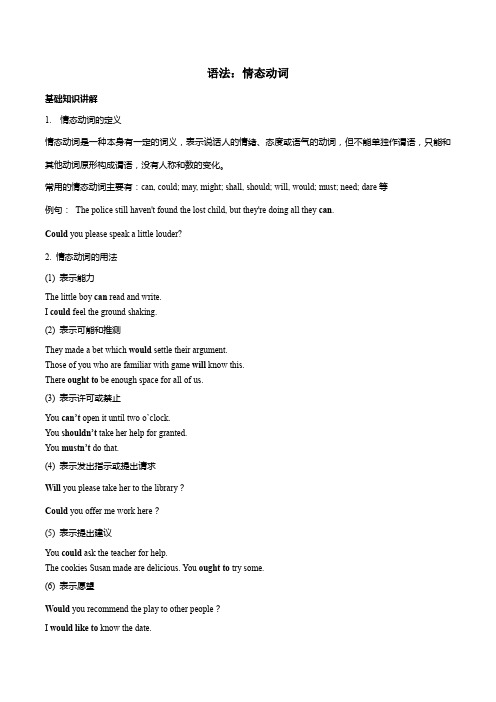
语法:情态动词基础知识讲解1. 情态动词的定义情态动词是一种本身有一定的词义,表示说话人的情绪、态度或语气的动词,但不能单独作谓语,只能和其他动词原形构成谓语,没有人称和数的变化。
常用的情态动词主要有:can, could; may, might; shall, should; will, would; must; need; dare等例句:The police still haven't found the lost child, but they're doing all they can.Could you please speak a little louder?2. 情态动词的用法(1) 表示能力The little boy can read and write.I could feel the ground shaking.(2) 表示可能和推测They made a bet which would settle their argument.Those of you who are familiar with game will know this.There ought to be enough space for all of us.(3) 表示许可或禁止You can’t open it until two o’clock.You shouldn’t take her help for granted.You mustn’t do that.(4) 表示发出指示或提出请求Will you please take her to the library?Could you offer me work here?(5) 表示提出建议You could ask the teacher for help.The cookies Susan made are delicious. You ought to try some.(6) 表示愿望Would you recommend the play to other people?I would like to know the date.(7) 表示义务和需要You must come at once.We have to wear uniforms at school.【过关检测】单项选择1.【★★★】—Mary knows the city quite well.—She______ well have been there before.A.need B.could C.should D.may【答案】D【解析】考查情态动词辨析。
Unit 1 情态动词 语法知识梳理 人教版高中英语必修第三册

Unit 1 语法Can/ could/ be able tocan、could与be able to都可以用于表示能力,区别在于:1. can仅表示某人现在有能力做某事,相当于am/is/are able to,但后者更正式。
例如:The police are doing all they can to find her.警方正在尽一切所能找她。
2. could表示某人在过去有能力做某事,相当于was/were able to。
例如:By the time she was eight, she could read Greek and Latin.她八岁时就会读希腊文和拉丁文了。
He was able to walk with a stick.他能拄着拐杖行走。
3. 表达将来有能力做某事用will be able to do。
例如:After only a few lessons, you will be able to understand basic Spanish.只需几节课之后,你就能听懂最基本的西班牙语了。
4. can、could仅能表达现在或过去的能力,但be able to 还含有成功地做成了某事,相当于manage to do sth./succeed in doing sth.。
例如:The fire spread through the hotel very quickly but everyone was able to get out.这场大火迅速蔓延到了整个宾馆,但是每个人都逃了出来。
I'm sorry that I wasn't able to phone you yesterday.对不起,昨天我没能给你打电话。
can、could除了表示能力还可用于以下用法:1. 表示请求和许可表示请求时,could更加委婉,不表示过去。
注意:could 通常不表示许可,因此回答仍用can。
人教版高中英语必修三语法总结

人教版高中英语必修三语法总结高中英语必修三语法主要考点有情态动词、名词性从句、同位语从句等,下面是具体的高中英语必修三语法,仅供参考。
1英语必修三有哪些语法要学考点一情态动词(unit1,unit2)一、情态动词的特点:1.没有人称和数的变化。
2.有些情态动词有过去式的变化:e.g.will→would,can→could,may→might,dare→dared二、情态动词的否定式:情态动词+not+动词原形cannot:can’t,mustnot:mustn’t,neednot:needn’t三、情态动词的用法及相互区别,是考试的内容之一1.can,beabletobeableto表示经过努力后,能够做到;beableto有多种形式的变化。
can1).表示体力或脑力方面的能力;2).表示允许、可能性。
could是can的过去式,表示过去有能力及过去存在的可能性;用于疑问句表示委婉地提出问题。
1)Thefirespreadthroughthehotelveryquicklybuteveryone____getout.(NMET97)A.hadtoB.wouldC.couldD.wasableto2)-Willyoustayforlunch?-Sorry,__.Mybrotheriscomingtoseeme.(NMET99)A.Imustn’tB.Ican’tC.Ineedn’tD.Iwon’t2.may表示询问或说明一件事可不可做;表示某事有可能发生。
might是may的过去式;用在疑问中比may委婉、客气。
1)-MayItakethisbookoutofthereading-room?-No,youmustn’t.(Yes,youmay.)2)-MightImakeasuggestion?-Yes,youmay.3.must1).表示必须要做的事:必须2)表示很有把握的推断:一定,准是。
have(has)to:have(has)gotto必须,不得不。
新人教必修3_Unit1_Grammar情态动词]
![新人教必修3_Unit1_Grammar情态动词]](https://img.taocdn.com/s3/m/35b7c822453610661ed9f4a7.png)
3. may 与might
1). 表示“许可”或“请求”,在这样的句中,might比m 语气更委婉,客气。 肯定回答用may或can,否定 回答时用mustn't或can't,表示“不可以”或“禁止”。 Eg: --- May I come in ? 我可以进来吗? --- Yes, you may/can. 可以,请进来。 --- No, you mustn’t/can't. 不,你不能。
4. 用于祈使句表祝愿。
Eg: May you succeed! May God bless you!
5. may have done 和might have done 表示 对过去的推测。
1. Sorry I'm late. I _____ A have turned off the alarm clock and gone back to sleep again. A. might C. can B. should D. will
二、表示对过去所发生事情的遗憾或责备
1. should/ought to have done “过去本该做而没做” eg: I really regretted wasting the hours when I should have studied hard, but it was too late. 2. shouldn’t/oughtn’t to have done “过去不该做的事却做了” eg: I’m very sorry for the words I shouldn’t have said to you at that moment. 3. could/might have done “本来能够做的事却没做” eg: He could have worked out the problem.
人教版高中英语必修3 五个单元语法知识点汇总
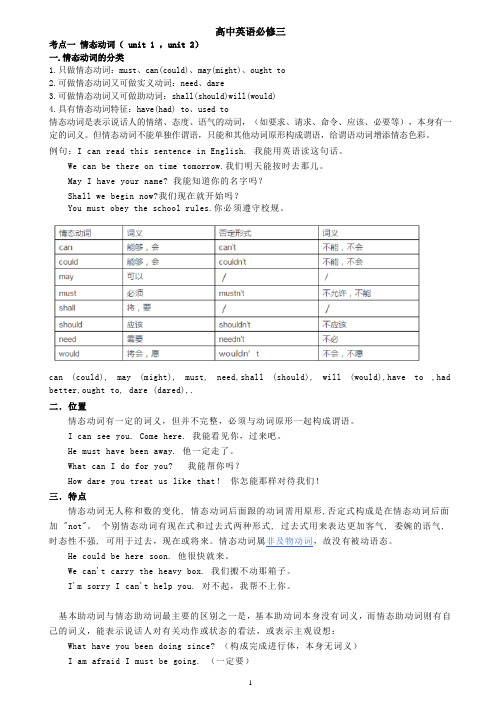
高中英语必修三考点一情态动词( unit 1 ,unit 2)一.情态动词的分类1.只做情态动词:must、can(could)、may(might)、ought to2.可做情态动词又可做实义动词:need、dare3.可做情态动词又可做助动词:shall(should)will(would)4.具有情态动词特征:have(had) to、used to情态动词是表示说话人的情绪、态度、语气的动词,(如要求、请求、命令、应该、必要等),本身有一定的词义。
但情态动词不能单独作谓语,只能和其他动词原形构成谓语,给谓语动词增添情态色彩。
例句:I can read this sentence in English. 我能用英语读这句话。
We can be there on time tomorrow.我们明天能按时去那儿。
May I have your name? 我能知道你的名字吗?Shall we begin now?我们现在就开始吗?You must obey the school rules.你必须遵守校规。
can (could), may (might), must, need,shall (should), will (would),have to ,had better,ought to, dare (dared),.二.位置情态动词有一定的词义,但并不完整,必须与动词原形一起构成谓语。
I can see you. Come here. 我能看见你,过来吧。
He must have been away. 他一定走了。
What can I do for you? 我能帮你吗?How dare you treat us like that!你怎能那样对待我们!三.特点情态动词无人称和数的变化, 情态动词后面跟的动词需用原形,否定式构成是在情态动词后面加 "not"。
个别情态动词有现在式和过去式两种形式, 过去式用来表达更加客气, 委婉的语气, 时态性不强, 可用于过去,现在或将来。
英语必修三情态动词
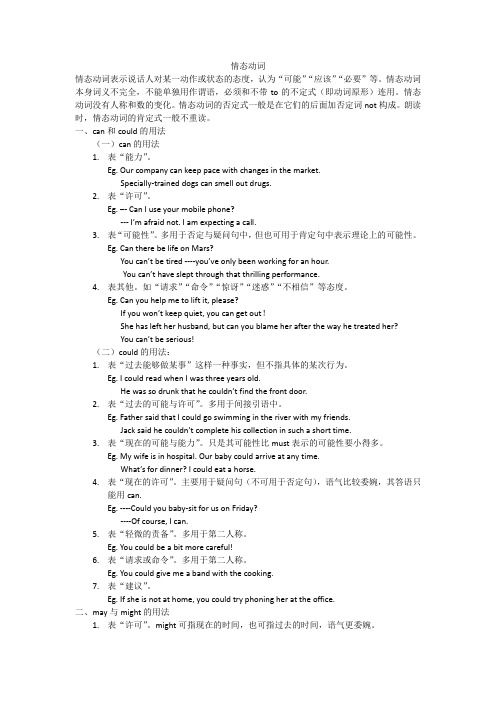
情态动词情态动词表示说话人对某一动作或状态的态度,认为“可能”“应该”“必要”等。
情态动词本身词义不完全,不能单独用作谓语,必须和不带to的不定式(即动词原形)连用。
情态动词没有人称和数的变化。
情态动词的否定式一般是在它们的后面加否定词not构成。
朗读时,情态动词的肯定式一般不重读。
一、can和could的用法(一)can的用法1.表“能力”。
Eg. Our company can keep pace with changes in the market.Specially-trained dogs can smell out drugs.2.表“许可”。
Eg. –- Can I use your mobile phone?--- I’m afraid not. I am expecting a call.3.表“可能性”。
多用于否定与疑问句中,但也可用于肯定句中表示理论上的可能性。
Eg. Can there be life on Mars?You can’t be tired ----you’ve only been working for an hour.You can’t have slept through that thrilling performance.4.表其他。
如“请求”“命令”“惊讶”“迷惑”“不相信”等态度。
Eg. Can you help me to lift it, please?If you won’t keep quiet, you can get out!She has left her husband, but can you blame her after the way he treated her?You can’t be serious!(二)could的用法:1.表“过去能够做某事”这样一种事实,但不指具体的某次行为。
Eg. I could read when I was three years old.He was so drunk that he couldn’t find the front door.2.表“过去的可能与许可”。
必修3Unit1情态动词语法ppt课件
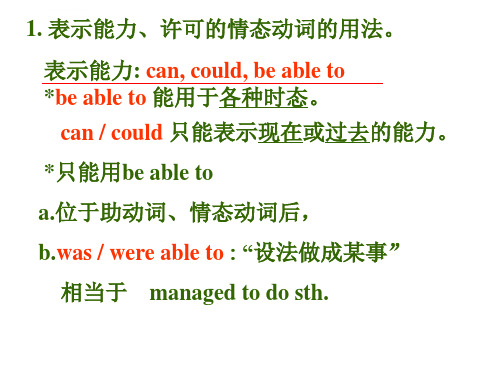
例1:---Could I borrow your dictionary?
---Yes, of course you____.
A. might
B. will
C. can
D. should
析:选C。该句用can的委婉表达式could 来征 求对方意见,could 和might通用,但回答 时必须要用can或may,因此该题不选A.
火灾袭来时要迅速疏散逃生,不可蜂 拥而出 或留恋 财物, 要当机 立断, 披上浸 湿的衣 服或裹 上湿毛 毯、湿 被褥勇 敢地冲 出去
should
should
should用于构成将来时是助动词。should用于表示 “应当”“猜测”是情态动词。
(1) 表示义务,责任,意为“应当” 。
You should pay for your taxes.
析:选A。根据规定need用于一般疑问句 作肯定回答应换成must,而作否定回答 时,使用need的否定式needn’t。
火灾袭来时要迅速疏散逃生,不可蜂 拥而出 或留恋 财物, 要当机 立断, 披上浸 湿的衣 服或裹 上湿毛 毯、湿 被褥勇 敢地冲 出去
7.
shall和should的用法
• Shall
火灾袭来时要迅速疏散逃生,不可蜂 拥而出 或留恋 财物, 要当机 立断, 披上浸 湿的衣 服或裹 上湿毛 毯、湿 被褥勇 敢地冲 出去
例1:---Must I start at once?
---No, you____.
A. needn’t
B. mustn’t
C. can’t
D. won’t
析:A。由语境可知该答句表示“不必”, 而mustn’t表示“不准、禁止”,不符合语 境,显然应使用needn’t表示“不必”,但 肯定句回答继续用must。
英语必修三情态动词

情态动词情态动词表示说话人对某一动作或状态的态度,认为“可能”“应该”“必要”等。
情态动词本身词义不完全,不能单独用作谓语,必须和不带to的不定式(即动词原形)连用。
情态动词没有人称和数的变化。
情态动词的否定式一般是在它们的后面加否定词not构成。
朗读时,情态动词的肯定式一般不重读。
一、can和could的用法(一)can的用法1.表“能力”。
Eg. Our company can keep pace with changes in the market.Specially-trained dogs can smell out drugs.2.表“许可”。
Eg. –- Can I use your mobile phone?--- I’m afraid not. I am expecting a call.3.表“可能性”。
多用于否定与疑问句中,但也可用于肯定句中表示理论上的可能性。
Eg. Can there be life on Mars?You can’t be tired ----you’ve only been working for an hour.You can’t have slept through that thrilling performance.4.表其他。
如“请求”“命令”“惊讶”“迷惑”“不相信”等态度。
Eg. Can you help me to lift it, please?If you won’t keep quiet, you can get out!She has left her husband, but can you blame her after the way he treated her?You can’t be serious!(二)could的用法:1.表“过去能够做某事”这样一种事实,但不指具体的某次行为。
Eg. I could read when I was three years old.He was so drunk that he couldn’t find the front door.2.表“过去的可能与许可”。
人教版高中英语必修3 Unit1 情态动词第四讲:need、dare 基本用法

(天津高考)
It’s quite warm here; we ________ turn the heldn’t
B. mustn’t
走进dare
你敢吗?-dare 基本用法特点
1. dare用作情态动词时,意思是“敢”,其后接动词原形,通常只
1. I wonder how he A. dare to say C. not dare say
实战演练
that to the teacher. B. dare saying D. dared say
课程小结
need dare
用法小结
情态动词 (+动词原形)
实意动词
多用于肯定句; (sb.) need to do
你需要特别记need
need作为实意动词 有人称、数和时态的变化(在变为否定句和疑问句时 需借助于助动词)
(1)当主语是人时,后可接名词和动词不定式, 即: need sth./ need to do sth. 如: He needs some help. 他需要一些帮助。
特殊用法
need作名词用,当“需要,必需”解,不可数。可构成下列短语和 句型:
实战演练
1._T_h_e_r_e_i_s_n_o__n_e_e_d_t_o_ worry at all. 根本没有必要担忧。 2.I’ll come when you __a_r_e_i_n_n_e_e_d__o_f__ help.
典型应用
通过前面的学习,相信大家对这堂课的知识 点有了初步的了解。下面我们通过几个例题 加深对知识的理解及运用:
2. dare用作实意动词时意为“敢于”,可以有各种词形变化,可用于 各类句型(肯定句、否定句、疑问句及各类从句等),其后多接带to的不定 式,有时to也可省去(尤其是在否定句或疑问句),可用于非谓语形式,完 成时态等:
人教版高中英语必修3新人教版必修三Unit 1 Festivals around the world 语法情态动词

情态动词情态动词表示说话人的语气和情态。
如需要、可能、愿意、怀疑等。
情态动词有一定的词义,但不完整,必须和主要动词的原型一起构成谓语。
常用的情态动词有:can, could, may, might, must, have to, ought to, need, dare, shall, will, should, would, be able to,及半情态动词be to do, had better等。
情态动词的基本用法:(一)can“能够”1.表示体力或脑力方面的能力,或根据客观规律能做某事的能力。
如:I can go there now.(1)can表“能够”时,既可指现在也可指将来。
(2)can与be able to的区别:①表“能力”时二者同义No one can / is able to do it.②be able to常侧重经过努力有能力做到,有多种时态。
can侧重自身的能力,只有一般现在时和一般过去时。
③was / were able to do表示通过努力克服困难或在一定的条件下成功地做了某事,侧重结果,相当于managed to do或succeeded in doing...。
could仅表自身的能力或本领,但未必成功做到。
With the help of the firemen, they were able to leave the burning house.He was able to swim across the river.In the end, we were able to rescue the workers trapped in the fire.2.表示“许可,允许”。
在疑问句中表示请求,许可;否定句中表示“不许”。
此时常与may 通用:May/Can I do it?This sort of thing can't go on! 这类事情不能再继续了!can not有时可以表示“禁止”相当于mustn't:You can't(mustn't,are not allowed to)play football in the street.你不可以在大街上踢球。
必修三英语unit1情态动词的用法
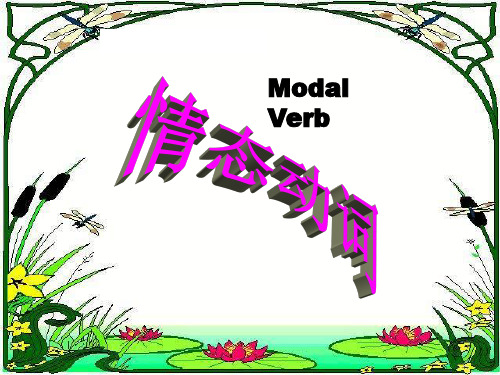
情态动词表推测
可能性的强弱层次
must > should/ought to > can/could>
may/might
1. That ______ be Ann’s husband, for I am sure that he doesn’t wear glasses.
A. can’t
B. may not
情态动词的语法特征
1.不能单独做谓语,即是情态动词+动词原形。 例如:I can swim.(谓语)
(除ought to “应该”和have to“不得不”外) 2.情态动词没有人称,数的变化。 3.有些情态动词有一般式和过去式,过去式比一
般式更委婉。 如can-could , will-would, may-might,
必修三英语unit1情态动词的用法
should 1. Young people should respect old people.
should 表“义务,建议”。 2. It’s five o’clock. John should be at home now. 表推测,按道理应当。译为“理应,估计 We have prepared a fridge of good and drinks. That should be enough for the party.
During the vacation he would often visit me.(过去式)
4. 某种特定情况下真实或可能的事情 At that time, people would starve if
food was difficult to find.
必修三英语unit1情态动词的用法
2. mustn’t 禁止
人教版必修三第一单元语法:情态动词基本用法

Book 3 Unit 1 Festivals around the world高考常考情态动词的基本用法总结:can1) 能力Mary can speak three foreign languages.玛丽能说三门外语。
注意:can只能表示现在的能力,could表示过去的能力,be able to do可以表示现在、将来和过去的能力,am/is /are able to do ,will be able to do,was/ were able to docould表示过去的能力,不表示是否做was/ were able to do 表示过去有能力做并且成功做了Tom could swim at the age of nine.could(过去的能力,不表是否做)汤姆在九岁就能游泳。
The fire spread through the hotel very quickly but everyone was able to get out .( was able to过去有能力做,并且成功做了)was able to 在本句相当于manage to do /succeeded to do尽管这场大火迅速蔓延到了整个宾馆,但是每个人都逃了出去。
2)许可/允许--Can /Could(表委婉/客气) I use your pen?我可以用一下你的钢笔吗?--Yes, you can.(回答只能用can)--No, I’m afraid not.3)可能(在否定句和疑问句中表示具体发生的可能性,在肯定句中表示理论上的可能性)--Can it be true ?那事可能是真的吗?--It can’t be true.它不可能是真(具体发生的可能性Harvest and Thanksgiving festival can be very happy events.(理论上的可能性)收获节和感恩节可能是非常喜庆的节日。
人教版 必修三 Grammar 情态动词基本用法

can, could 和be able to的用法
2.can只用于现在时和过去时(could)。 be able to可以用于各种时态。 e.g. We’ll be able to finish the work soon. I haven’t been able to see the film. could用于表示泛指过去的能力。 e.g. I could read when I was four.
It‟s so late. I thing he may/might have gone to bed. You might have given him more help, but why didn‟t you?(表示对过去发生的动作进行可能性推测。 )
3) may用于祈使句表示祝愿
可能性依次减弱
must对比have to
1) 两词都是‘必须’的意思,have to 表示客观的需 要, must 表示说话人主观上的看法,既主观上的必 要。 My brother was very ill, so I had to call the doctor in the middle of the night. He said that they must work hard. 2) have to有人称、数、时态的变化,而must只有一 种形式。 He had to look after his sister yesterday. 3) 在否定结构中: don„t have to 表示“不必” mustn‟t 表示“禁止” You don„t have to tell him about it.
should 在虚拟语气中的使用
表示要求,建议,命令,请求的从句: It is suggested/ advised/ commanded/ ordered/required/ requested/proposed that sb. should do sth. Sb. suggest/advise/…that sb should do sth. My suggestion/advice is that sb should do He put forward the suggestion that…
高中英语新人教版必修三Unit 5语法汇总(过去将来时+情态动词)
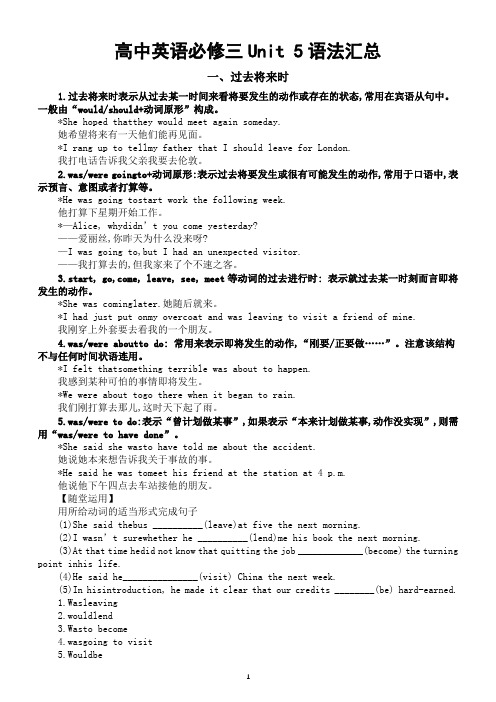
高中英语必修三Unit 5语法汇总一、过去将来时1.过去将来时表示从过去某一时间来看将要发生的动作或存在的状态,常用在宾语从句中。
一般由“would/should+动词原形”构成。
*She hoped thatthey would meet again someday.她希望将来有一天他们能再见面。
*I rang up to tellmy father that I should leave for London.我打电话告诉我父亲我要去伦敦。
2.was/were goingto+动词原形:表示过去将要发生或很有可能发生的动作,常用于口语中,表示预言、意图或者打算等。
*He was going tostart work the following week.他打算下星期开始工作。
*—Alice, whydidn’t you come yesterday?——爱丽丝,你昨天为什么没来呀?—I was going to,but I had an unexpected visitor.——我打算去的,但我家来了个不速之客。
3.start, go,come, leave, see, meet等动词的过去进行时: 表示就过去某一时刻而言即将发生的动作。
*She was cominglater.她随后就来。
*I had just put onmy overcoat and was leaving to visit a friend of mine.我刚穿上外套要去看我的一个朋友。
4.was/were aboutto do: 常用来表示即将发生的动作,“刚要/正要做……”。
注意该结构不与任何时间状语连用。
*I felt thatsomething terrible was about to happen.我感到某种可怕的事情即将发生。
*We were about togo there when it began to rain.我们刚打算去那儿,这时天下起了雨。
人教版高一英语英语必修3Unit1语法情态动词 (共35张PPT).ppt

2. ---Where is Emma? ---I can’t say for sure where she is, but she___ be out shopping. A. can B. should C. must D. may
3. The room is in a terrible mess; it ____ cleaned. A. can’t have been B. couldn’t be C. may have been D. would be
hotel, but perhaps I have driven her there. (2007 陕西)
A. could
B. must
C. night
D. should
• Will you please take a message for him?
• Would you please tell me your telephone number?
2020年3月27日星期五
16
2.表示习惯或倾向, 意为“总是”,“习惯于”。
eg: • Fish will die without water. • People will talk. (人们总会说闲话。)
eg: Everybody must obey the law.
You mustn’t drive so fast in the street.
2. 表示有把握的猜测。“一定”、“准是” 结构:must be
eg: He must be an honest boy.
★用must 提问,回答方式
肯定回答:yes, please / I’m afraid so 否定回答 :needn’t / don’t have to
人教英语必修三-情态动词、句子结构
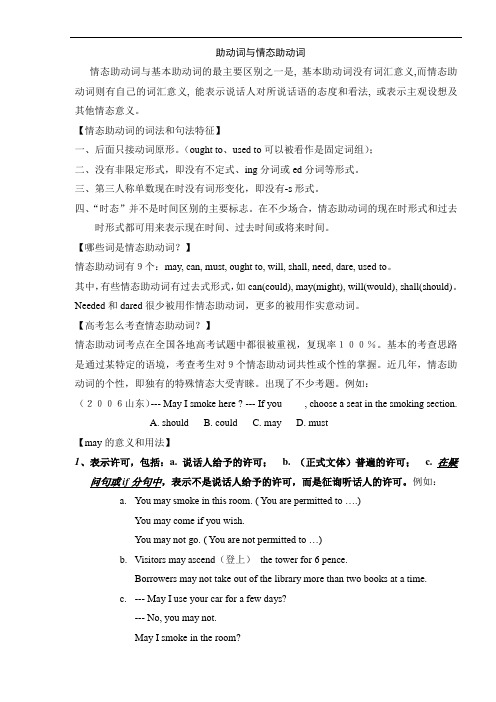
助动词与情态助动词情态助动词与基本助动词的最主要区别之一是, 基本助动词没有词汇意义,而情态助动词则有自己的词汇意义, 能表示说话人对所说话语的态度和看法, 或表示主观设想及其他情态意义。
【情态助动词的词法和句法特征】一、后面只接动词原形。
(ought to、used to可以被看作是固定词组);二、没有非限定形式,即没有不定式、ing分词或ed分词等形式。
三、第三人称单数现在时没有词形变化,即没有-s形式。
四、“时态”并不是时间区别的主要标志。
在不少场合,情态助动词的现在时形式和过去时形式都可用来表示现在时间、过去时间或将来时间。
【哪些词是情态助动词?】情态助动词有9个:may, can, must, ought to, will, shall, need, dare, used to。
其中,有些情态助动词有过去式形式,如can(could), may(might), will(would), shall(should)。
Needed和dared很少被用作情态助动词,更多的被用作实意动词。
【高考怎么考查情态助动词?】情态助动词考点在全国各地高考试题中都很被重视,复现率100%。
基本的考查思路是通过某特定的语境,考查考生对9个情态助动词共性或个性的掌握。
近几年,情态助动词的个性,即独有的特殊情态大受青睐。
出现了不少考题。
例如:(2006山东)--- May I smoke here ? --- If you ____, choose a seat in the smoking section.A. shouldB. couldC. mayD. must【may的意义和用法】1、表示许可,包括:a. 说话人给予的许可; b. (正式文体)普遍的许可; c. 在疑问句或if分句中,表示不是说话人给予的许可,而是征询听话人的许可。
例如:a.Y ou may smoke in this room. ( Y ou are permitted to ….)Y ou may come if you wish.Y ou may not go. ( Y ou are not permitted to …)b.Visitors may ascend(登上)the tower for 6 pence.Borrowers may not take out of the library more than two books at a time.c.--- May I use your car for a few days?--- No, you may not.May I smoke in the room?If I may say so, your work needs revision. ( If you allow me to say so,… )If I may ask, how much money can you make in a year.“May I …” 征询对方许可在语体上比较正式。
- 1、下载文档前请自行甄别文档内容的完整性,平台不提供额外的编辑、内容补充、找答案等附加服务。
- 2、"仅部分预览"的文档,不可在线预览部分如存在完整性等问题,可反馈申请退款(可完整预览的文档不适用该条件!)。
- 3、如文档侵犯您的权益,请联系客服反馈,我们会尽快为您处理(人工客服工作时间:9:00-18:30)。
情态动词的特点 • 情态动词有一定的意义 • 无人称和数的变化 • 通常不带to ,后接动词原形 • 表示说话人的语气或情绪
情态动词备考方向:
• • • • 1. 各情态动词的基本用法; 2. 易混淆情态动词的辨析; 3.情态动词在特定语境中的用法 4.虚拟语气中情态动词的用法.
8. used to do sth 过去常常做某事
• I used to go to the cinema a lot. • He used to be a heavy smoker, didn‟t he? • He used to be a heavy smoker, usedn‟t he?
9. will
5.Should 的用法
• (1) 用于表示义务或责任 You shouldn‟t drink and drive. Visitors should inform the receptionist of their arrival. (2)用于表示劝告或推荐 He should stop smoking. You shouldn‟t leave the baby alone in the house. They should have called the police. (3)用于表示假定的结果 If I was asked to work on Sundays , I should resign. We should move to a larger house if we had the money.
• • • •
3)表示许可/允诺 ---Can/Could Tom use the car? ---Yes , he can. You can have my seat. I am going now.
• 4) 表示推测 • 1) ---Someone is knocking at the door. Who can it be? Can it be Scarlet? • ---No, it can‟t be her. She called from Tokyo just now. • 2) He can not have forgotten it. • 3) The accident could have been avoided.
7.可兼做行为动词的情态动词:need 、 dare 情态动词 (+动词原形) 行为动词
1.无人称和数的变化; 多用于肯定句; need 2.尤其用于: (sb.) need to do *否定句及疑问句中; dare to do *在if/whether之后; . (sth.) need to be *或与hardly, never, no one, nobody连用; done dare 3.常以needn’t 和daren’t (sth.) need doing 的形式出现; 4.dare有其过去时dared.
7. need Do you need any help? I wonder whether he need send it immediately. I need hardly tell you that the work is dangerous. The garden doesn’t need watering at the moment. You needn’t finish that work today.
ought to 和should
• 1) ought to : 比should语气强烈,一般用于肯 定和否定句 • They ought to be there by now. • You ought not to be late again. • ought to have done sth. =should have done sth. 本应该做某事而没有. • ought not to have done sth.=should not have done sth. 本不应该做某事而做了. • They ought to have handed in the paper yesterday. 他们本应当昨天交论文。 • You ought not to have wasted your time.
• (8).用于表达不成熟的意见. I should say she‟s over forty. I should imagine It will take about three hours. (9). 与疑问词连用表示不感兴趣,难以置信等 How should I know? Why should he think that? I turned round on the bus and who should be sitting behind me but my ex-wife.
7. dare I daren’t ask her for a rise. How did you dare to tell her that? I wonder whether he dare stand up in public. I don’t know how she dares to wear that dress.
How many modal verbs can you remember?
will/would
can/could
have/had to used to ought to
dare
may/might
modal verbs
shall/should must
need
1. can/could
• • • • 1)表示能力 He can play table tennis quite well. 2) 表示事物一时的特征, 理论上的可能性 It‟s always warm here, but sometimes it can be very cold. • He‟s good-tempered. However, he can be hard to deal with when offended. • Even an experienced teacher can make mistakes.
Should 的用法
(4).用于形容词anxious, sorry, concerned, happy, delighted 等后接的从句中. We are sorry that you should feel uncomfortable. That he should speak to you like that is quite astonishing. (5).用于if 和in case引导的从句表示某事不太可 能. If you should change your mind, do let me know. Should anyone telephone, please tell them I‟m busy.
判断正误: How dare you say such a thing? How dare you to say such a thing?
ห้องสมุดไป่ตู้
He daren’t to speak English before such a crowd, did he? He daren’t speak English before such a crowd, dare he?
3. must
• • • • • • • • • • • • 1. 必须 Must I say “sorry”? Yes, you must. / No, you needn‟t. You must see a doctor. 2. 猜测 “肯定,准是” She must be watching TV now. There must be some mistake. It must have rained last night. The ground is so wet. 3. “偏要,硬要” If you must smoke, please go out. 4. 否定,表示 “禁止” You mustn‟t play with fire. You may hurt yourself.
must对比have to
• 1) 两词都是‘必须’的意思,have to 表示客观的需 要, must 表示说话人主观上的看法,既主观上的必 要。 • My brother was very ill, so I had to call the doctor in the middle of the night. • He said that they must work hard. • 2) have to有人称、数、时态的变化,而must只有一 种形式。 • He had to look after his sister yesterday. • 3) 在否定结构中: don„t have to 表示“不必” mustn‟t 表示“禁止” • You don„t have to tell him about it.
• 做助动词 :表示单纯的将来)将 He will be home at six. 他六点回家。 • 做情态动词: • 1) (表示意志、意愿)愿,要 You will come, won't you? 你会来的,是不是? • 2) (表示经常性、习惯性)经常,惯于,总是 These things will happen. 这种事总是要发生的。
4.Shall的用法
(1). Shall 常用于第一人称表示简单的将来 When shall well meet again? I shall have finished my homework by Friday. (2) shall用于第二,三人称表示: a. 允诺或强烈的意志 It shall be done as you wish. You shall get a bike as your birthday present. B. 肯定会发生的事情 That day shall come. C.命令或必须执行之事. This law shall have effect in Scotland.
